New Delhi: Cataract remains a significant source of preventable blindness, especially for elderly individuals. Unfortunately, many Indians postpone treatment because of widespread misconceptions and insufficient knowledge. In light of June being Cataract Awareness Month, health experts said detecting cataracts early could prevent unnecessary vision loss.Worldwide statistics indicate that cataract is responsible for 33% of blindness cases. In India, cataract accounts for more than 66% of cases of blindness.Dispelling common myths about cataracts, Dr Mahipal Singh Sachdev, chairman & medical director, Centre for Sight Group of Eye Hospitals, explained, “Many people delay surgery due to myths and fears. A common myth is that cataracts only affect the elderly. While ageing is a major factor, cataracts can also be caused by diabetes, steroid use, UV exposure, trauma, and even affect children. Another myth is that eyedrops, diet or exercises can cure cataracts, but scientific evidence supports surgery as the only effective treatment.“Explaining what causes the eye lens to cloud, Dr Rinky Anand Gupta, associate director, ophthalmology (cataract & refractive surgery), Max Super Speciality Hospital, Vaishali, said that cataract was the result mainly of ageing, with protein breakdown in the lens occurring over time. Additional risk factors include diabetes, UV light exposure, smoking, eye injuries, steroid usage, and genetic predisposition. Some infants may develop congenital cataracts.Talking about the age group mainly affected, Dr Ashu Agarwal, senior ophthalmology consultant, Indraprastha Apollo Hospitals, said that while cataracts predominantly affected those over 60 years, lens clouding can develop earlier in individuals with specific risk factors like diabetes, trauma or family history. Congenital cataracts occur rarely in newborns. Due to increasing lifestyle-related risks, early-onset cataracts are now seen in adults as young as 40.“The decision to undergo cataract surgery should be based on how the condition affects one’s daily activities,” said Agarwal. “When tasks like reading, operating a vehicle or identifying people become challenging and impact lifestyle negatively, surgical intervention should be considered. Contemporary surgical techniques have advanced significantly, enabling successful treatment in early stages without waiting for complete cataract maturation.“Dr Anil Solanki, associate consultant, ophthalmology, Sir Ganga Ram Hospital, indicated that mature cataract caused blindness and potentially angle closure glaucoma, leading to permanent vision loss, with surgery was the only viable treatment.Dr Sachdev assured that cataract surgery was among the safest medical procedures, performed under local anaesthesia with minimal discomfort and swift healing. Modern surgery doesn’t necessarily require permanent spectacle use.Healthcare professionals said that advanced intraocular lenses (IOLs), including extended-depth-of-focus (EDOF) lenses, provided excellent vision at various distances while reducing spectacle dependency. Addressing the outdated beliefs is essential for encouraging timely treatment, they said. Contemporary cataract surgery offers a secure, efficient solution for vision restoration and professional consultation should be sought when initial symptoms show up.


